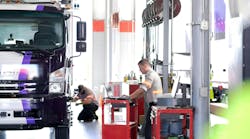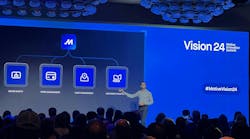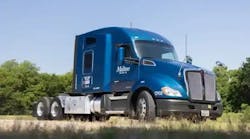Trucks carry 88% of Mexico's freight A report published jointly by the Mexican government and ANPACT, Mexico's national association of bus and truck manufacturers, underscores the growth in motor carriage in Mexico. For starters, trucks now haul approximately 88% of the total freight bill in Mexico. The results show that in 1996, Mexico's trucking fleet consisted of 308,500 units that hauled 370-million tons of freight. This year, those numbers are forecast to reach 320,000 units that will move approximately 375-million tons. Projections for the next several years are as follows: 1998, 333,000 units and 382-million tons; 1999, 345,000 units and 389-million tons; and 2000, 357,000 units and 396-million tons. According to the report, Mexico's for-hire motor carriage industry can be divided into general cargo, which accounts for 187,400 units, and specialized cargo, which uses 16,700 units. The largest number of heavy-vehicle sales in '96 were in Mexico City, which accounted for 29.27% of all sales. The State of Mexico took 12.93%; the State of Nuevo Leon, 12.71%; the State of Jalisco, 9.98%; and for the rest of the country, 35.11%. The Mexican trucking industry employs over 1.2-million workers directly. It is estimated that trucking indirectly generates 2.4-million jobs as well. Mexico's truckers currently contribute about 2.4% of the nation's GDP.
Birth of a Swedish-Japanese medium truck Sweden's Volvo Truck Corp. and Japan's Mitsubishi Motors will jointly develop a new medium-duty truck range. According to Volvo, the new Class 5-6 trucks will be emblazoned with Volvo badges and be sold at first only in Europe. While such other markets as Asia and Latin America may also get the trucks, the Swedish manufacturer says it has no plans to sell the line in the U.S., where it markets medium-duties under an agreement with General Motors. Mitsubishi, on the other hand, already sells its own medium trucks here and conceivably could replace those with the hybrid models. Production of the new truck is still several years away. Meanwhile, Volvo and Mitsubishi have also announced they will embark on reciprocal sales and joint development of trucks of all sizes. Volvo says it will sell Mitsubishi light trucks in Britain, France, and Italy, countries in which the Japanese OEM has no sales channels for trucks. An existing deal that also ties the two manufacturers together is the Medcar auto production venture they jointly operate in Holland.
Back to the barricades Apparently disgusted after not receiving a reduction in work time and a $500 bonus promised after last fall's transport strike, last month French truck drivers began manning 150 barricades to block intercity truck traffic across the country. And since France is a major north-south crossroads for Europe, the job action threatens everything from car production in Germany to grocery shelves in Britain. As European leaders urged France to at least keep the roads open to foreign-based trucks, the striking drivers had reason to believe Paris would be on their side. Prime Minister Lionel Jospin, who heads a leftist government, had earlier pledged he would insist that employers keep to the terms of any settlement. If that weren't enough to put fire in the drivers' bellies, one of the two Communists in Jospin's cabinet is Transport Minister Claude Gayssot. On the second day of the strike, Gayssot appeared at one of the roadblocks and told truckers there that this time they had a government that would look after their interests. In addition to receiving what last year's settlement promised them, the truckers' union also wants a raise in average gross driver pay of up to 7%, or about $1,750 a month.
Detroit-powered Stars for overseas U.S-based Detroit Diesel Corp. and the ERF Ltd. unit of Canada's Western Star Trucks are joining forces to field a new heavy-duty cabover design in Great Britain and Australia. The new ERF EC Series COE will be powered by 12.7-liter Detroit Diesel Series 60 engines for use in the British Isles. The engine will also be fitted to Australian versions of the truck, to be marketed as the Commander Series.
Making a big pond seamless The first European Union-United States forum on intermodal freight recently concluded in Washington with recommendations on how to develop "seamless" freight transport between North America and the nations of the European Union. The forum reported the chief needs as identifying intermodal-related legal and regulatory issues requiring resolution; holding another forum to exchange "best practices" on logistics and information technology; and conducting an information exchange to identify constraints on physical transportation infrastructure. The forum also suggested other areas for potential cooperation. A joint research project could identify pros and cons of international intermodal standards. In addition, methods could be developed for collecting intermodal statistics, and joint working groups could be established to reduce intermodal mishaps and help determine liability.
Toward free trade in the Americas According to the Alexandria, Va.-based North American Transportation Alliance, the trade ministers of 34 North and South American countries have agreed to further negotiations for establishing a Free Trade Area of the Americas (FTAA). However, the nations involved haven't yet reached consensus on how the talks should proceed. At recent meetings in Brazil, the representatives scheduled discussions to get under way in March. But they didn't agree on "objectives, approaches, structure, and venue" for the next round of talks.


